Hai @HarithaMaddi-MSFT
Followed your instructions.
Set my pipeline parameter LogicalKey, type String, value ['CODE','TYPE']
Set my dataflow parameter LogicalKey, type String [], no value
I debugged from the pipeline
Got an error in a Derived Column activity where I want to compute the hash
Column dim1_logicalkey_hash
Expression md5(byNames(split($LogicalKey,',')))
Error: Job failed due to reason: at Derive 'AddHashInput'(Line 19/Col 43): Function 'split' argument 1 should be StringType"
I need the parameter to be of type String [], because in my Sink Settings I set the Key Columns (custom expression) to $Logicalkey (in the hope this works)
Can you help?
Regards
Ron







